#battle of carrhae
Text

My son sent me this. I understand the Crassus joke but don’t get the Minecraft joke. My boy gets the Minecraft joke but can’t remember who Marcus Crassus is…..
#humour#memes#history#minecraft#rome#roman#spqr#triumvirate#marcus crassus#battle of carrhae#parthians#cataphracts
9 notes
·
View notes
Text
mfw i go to the desert with my good friend Ariamnes and there's a bunch of fucking cataphracts

2 notes
·
View notes
Text
Rome and Roads from the West
Rome and Roads from the West
Episode 17: Rome and Roads from the West
Foundations of Eastern Civilization
Dr Craig Benjamin (2013)
Film Review
I found this lecture valuable due to surprising insights on Roman history I’ve never encountered before.
Benjamin traces the collapse of republican rule in Rome to the economic collapse it experienced following its 16- year battle with the Carthaginian general Hannibal. During his…
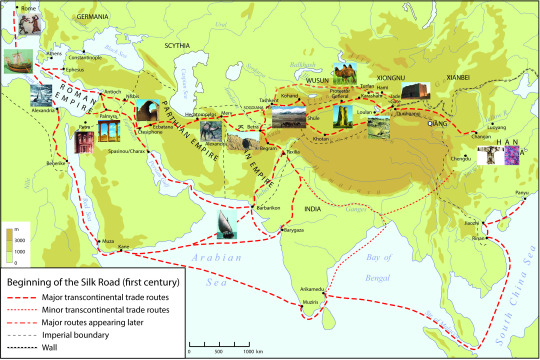
View On WordPress
#augustus#bactria#battle of carrhae#carthage#gaius gracchus#hannibal#indus valley#julius caesar#kushan#octavian#tiberius gracchus#zagros mountains
2 notes
·
View notes
Text
Surena: What's in these wagons? Well you see, my two hundred girlfriends are travelling with me. They brought their weed.
(In the wagons: Infinite Arrows.)
1 note
·
View note
Text
The Battle of Carrhae would mark the end of Crassus and the beginning of the war of Caesar and Pompey
Crassus was a ruthless man able to massacre slaves with a professional army and to gild his moneybags. What he was not, however, was a general capable of fighting forces of equal skill and determination. He found this out to his cost when he marched out to conquer Parthia, the Classical-age restoration of an Iranian Empire after the overthrow of the Seleucid regime in what's now Iran.
He proceeded to wage his campaign as a masterpiece of how not to fight a war and for it he was massacred and slain in that truly memorable fashion by the victorious Parthian generals. The longer-term effect was to ensure the onset of Roman-Parthian Wars that would become Roman-Sassanian Wars and then lead to the rise of the Caliphate in place of both.
#lightdancer comments on history#decline and fall of the Roman Republic#marcus licinius crassus#battle of carrhae#aka he attack Iran he run he die
1 note
·
View note
Text
something about crassus' moneypilled launderingmaxxer ways have enamoured me
#crassus#.... i miss youuu crassus#a few weeks ago i went on a battle of carrhae bender and consumed almost everything there was to read about carrhae itself#publius i miss youuuuu#something about crassus being the last of his family... his son marcus outliving his younger brother.... idk
3 notes
·
View notes
Text
Sort of fucked up how we all understand that war is only good for the one selling the weapons or profiting off of the regime change and yet also the tens of thousands of men who lost their lives in ancient wars are still glorified as heroes and fetishized as the masculine ideal, as if their lives weren't also rendered meaningless by their superiors' selfish desire to expand a fake line.
A fake line that was more of a fake general area, since borders weren't as concrete then as they are now, rendering the deaths of these real people even less meaningful than they already were.
#this post is about rome#crassus#war#20000 men killed at the battle of carrhae#at the very least#but rome was a brilliant and beautiful western empire#the suffering of ancient men means nothing#probably because of the aqueduct i guess
6 notes
·
View notes
Text
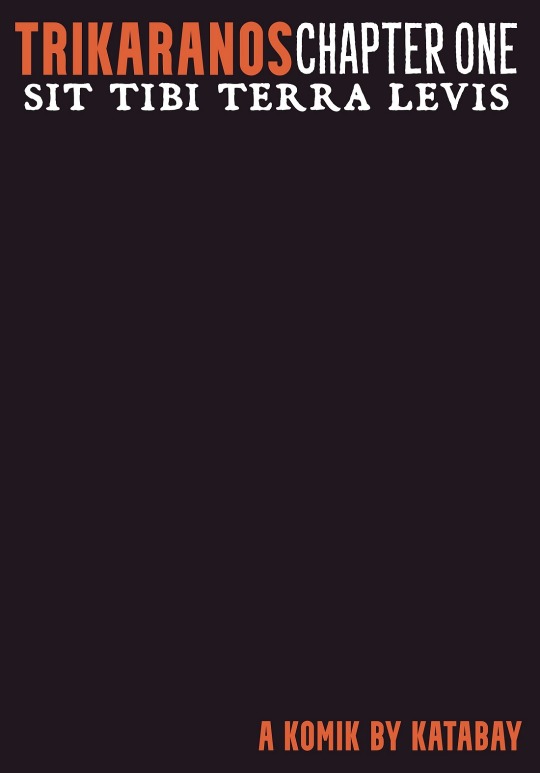
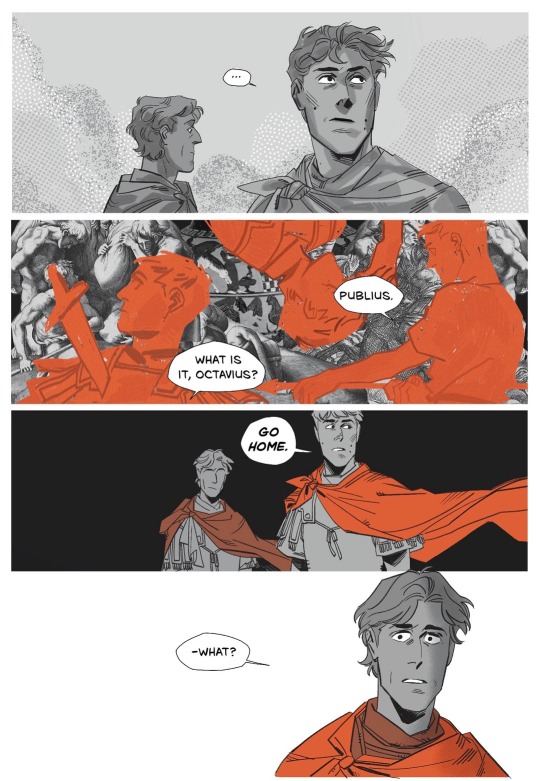
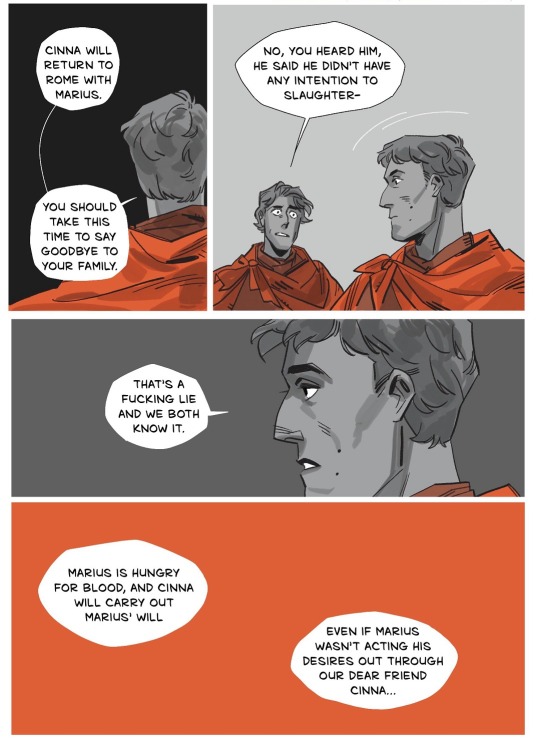
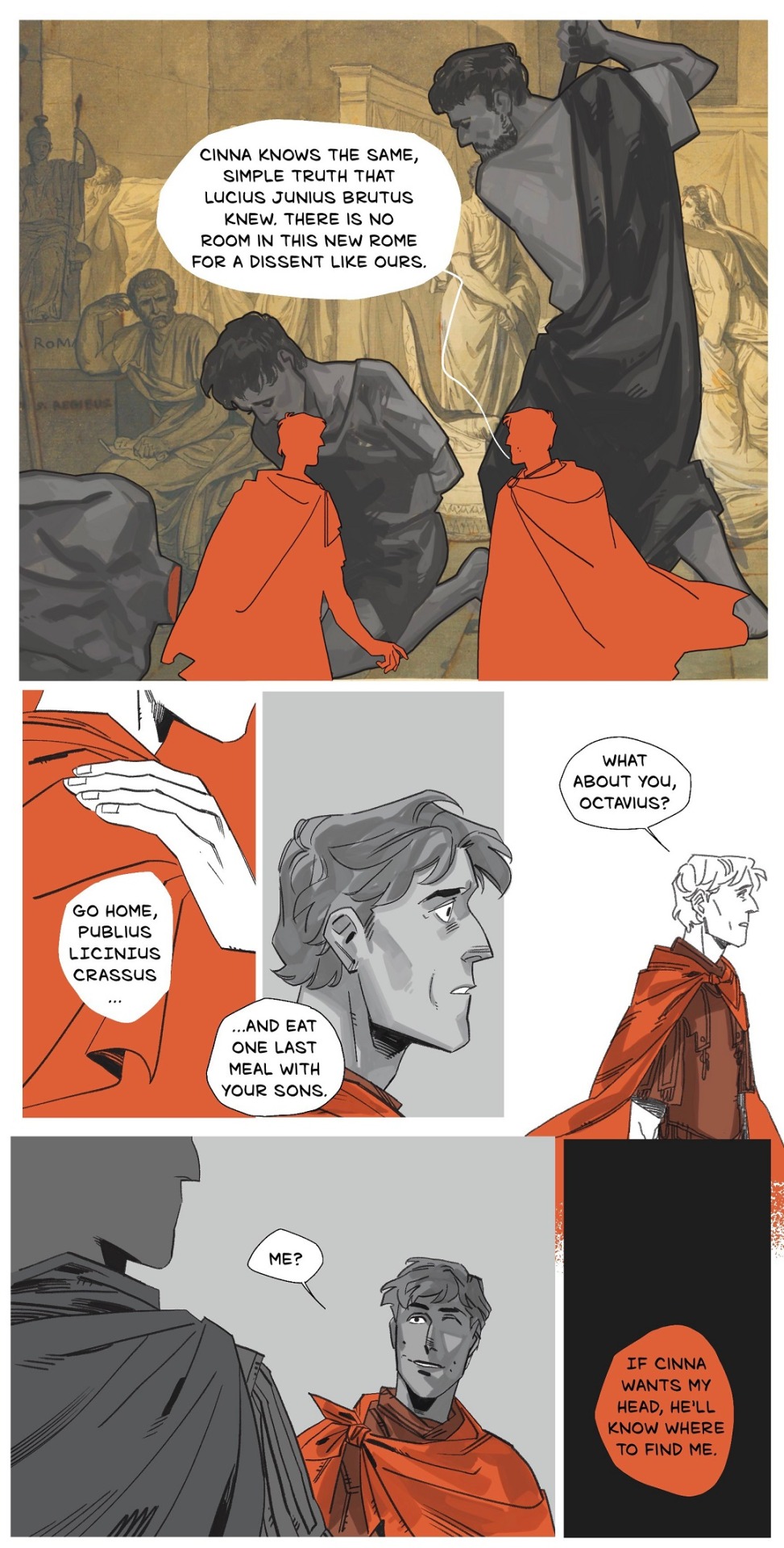
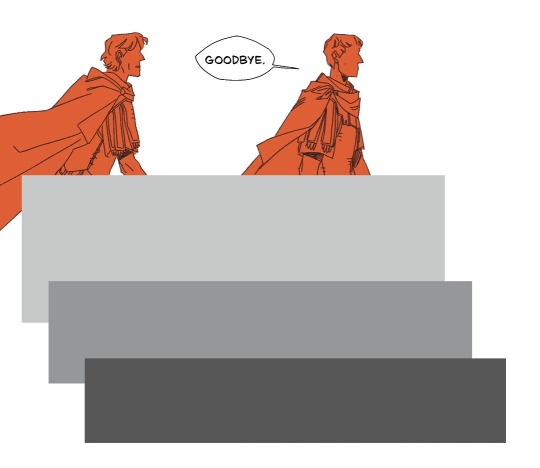
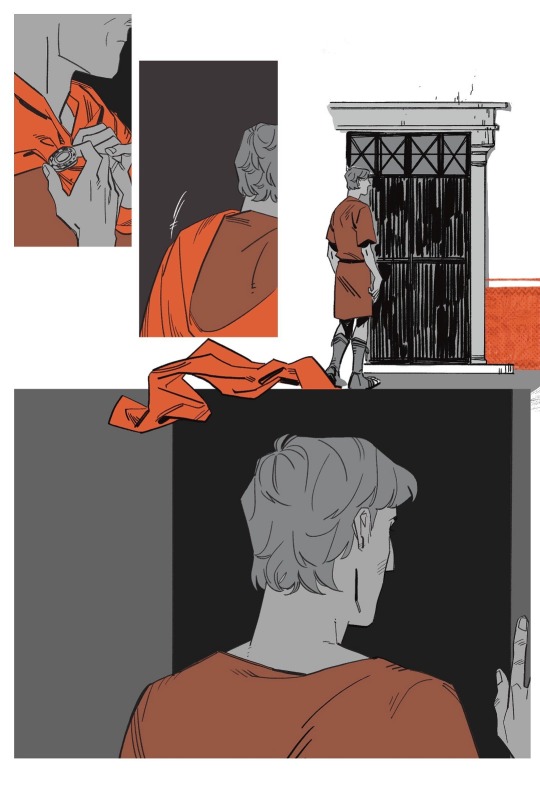
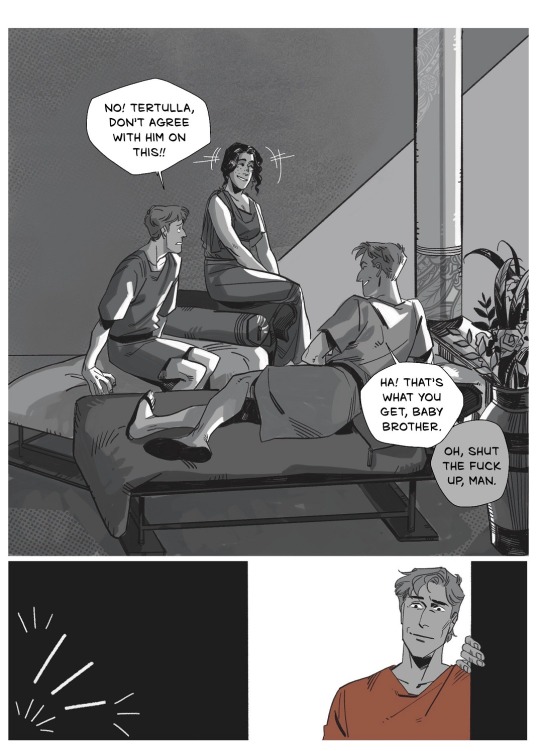
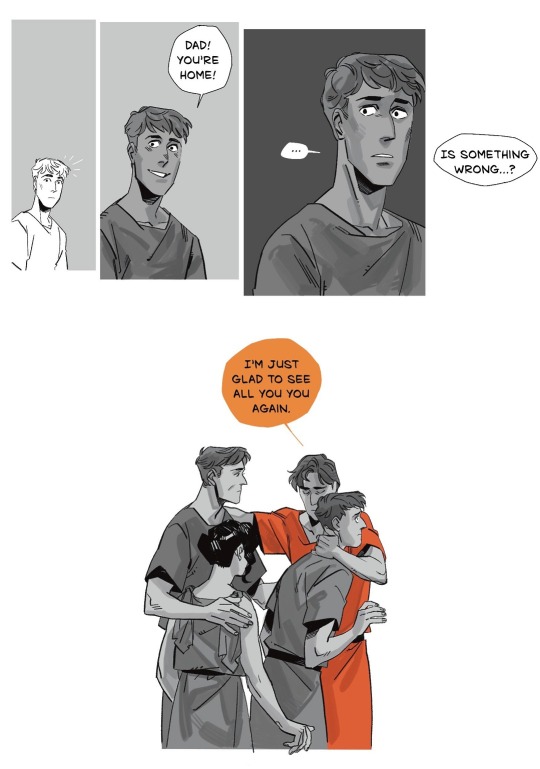
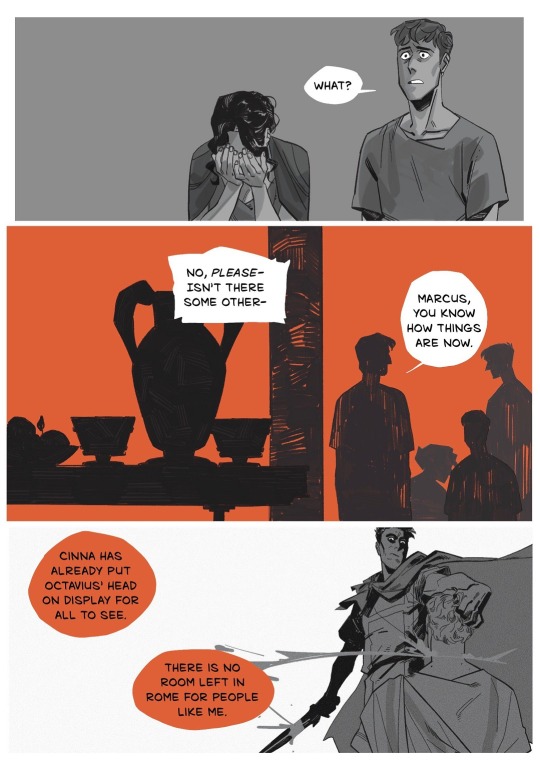
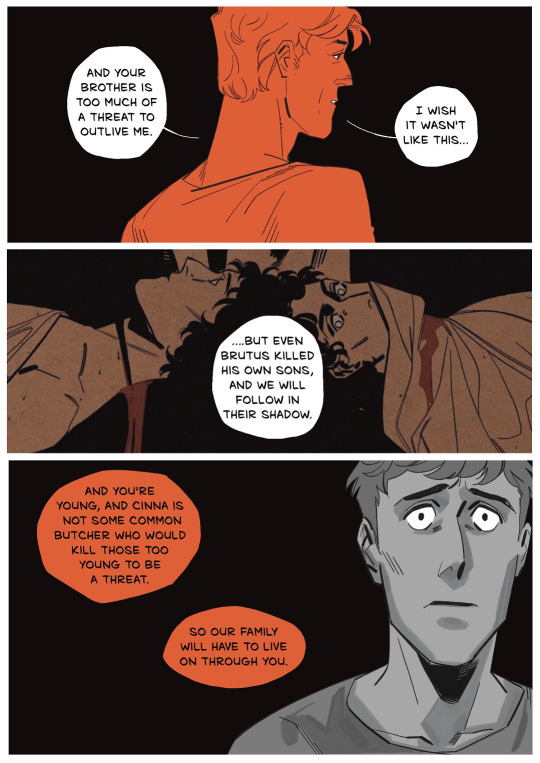
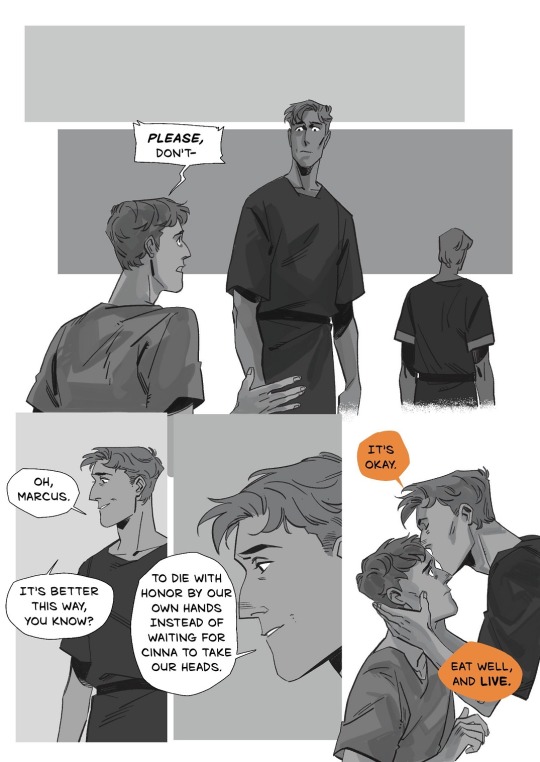
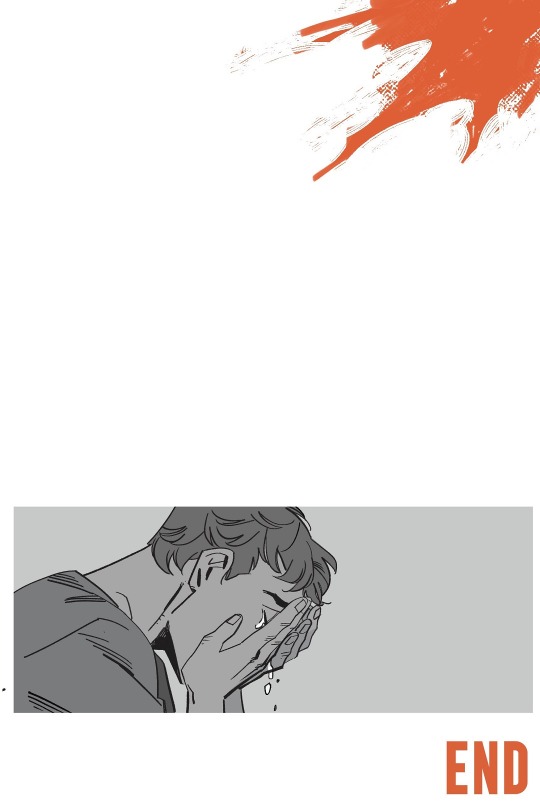
TRIKARANOS CHAPTER I: S·T·T·L
TRIKARANOS is a dramatized narrative based on ancient events following Crassus (and Pompey and Caesar) through the years 87-48 BCE. Intended for an adult audience.
⭐ Trikaranos will always be free to read. In the near future, you’ll have the option to support this comic & my ability to spend time making it (I Am Extremely Fucking Broke And Have Bills To Pay etc etc) through Patreon! currently, I have a tip jar!
⭐ There is no set update schedule (chapters vary in length and will be posted as I finish working on them)
⭐ alternative places to read it (coming soon!)
CREDITS all additional art used are in the public domain, and the specific images used are open access, etc
🍊the first collage panel is combination of: Plate 113: Greeks Battling the Trojans (from Ovid's Metamorphoses), Antonio Tempesta / The Trojans pulling the wooden horse into the city, Giulio Bonasone (after Francesco Primaticcio) / Terracotta hydria displaying Achilles waiting to ambush Triolos and Polyxena
🍊the second collage panel is: The Lictors bringing Brutus the bodies of his Sons, Jacques Louis David / the paint over of Brutus executing is own sons is my own work based on the composition of this relief of Brutus and condemning his sons to death.
🍊I also used my own art: a panel from the Prologue, and my own illustration of Brutus with the bodies of his sons
📖 PREVIOUS CHAPTER | START HERE | ToC (under construction!)
UNDER THE CUT creator’s commentary, ancient citations, whatever else seems relevant. ideally, this is optional! you shouldn’t need the citations for it to make sense as it unfolds since it’s a comic and a story first and foremost, but it’s here if you’re curious about something or want to see where the inspiration is coming from!
I'm so fucking normal about Crassus and his family (<<< this is a lie)
Marcus Crassus was the son of a man who had been censor and had enjoyed a triumph; but he was reared in a small house with two brothers. His brothers were married while their parents were still alive, and all shared the same table, which seems to have been the chief reason why Crassus was temperate and moderate in his manner of life. When one of his brothers died, Crassus took the widow to wife, and had his children by her, and in these relations also he lived as well-ordered a life as any Roman.
Plutarch, Crassus
like, it actively fucks me up that this is something that's survived about him for over 2,000 years. they all ate together at the same table. Jesus Christ.
so! Crassus' dad! Publius Licinius Crassus (consul 97) fought on the side of Cn. Octavius (consul 87) in the Bellum Octavianum, and it didn't go great for him.
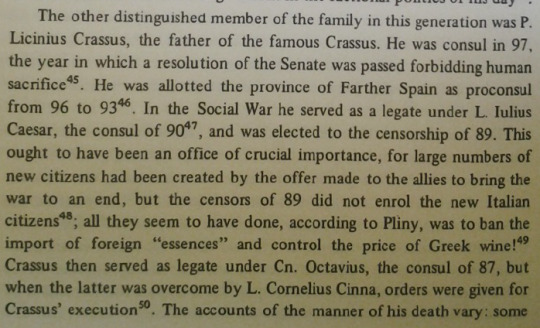
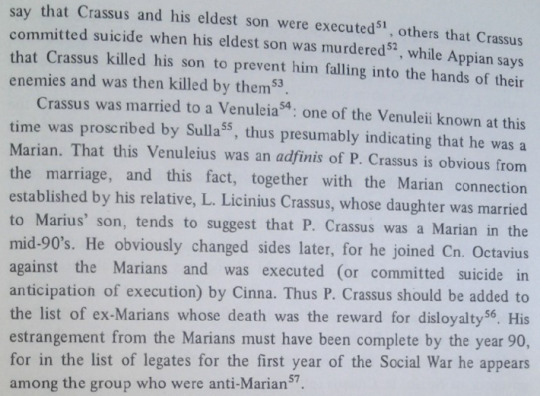
Crassus: A Political Biography, B.A. Marshall
also. currently, if you look Publius Licinius Crassus up on wikipedia for an overview, his page lists his son (and also my main character for this comic) with the cognomen Dives, which is in-fucking-correct.

Marcus Crassus and the Late Roman Republic, Allen Mason Ward
and to circle back to houses and meals shared with family, some citations that made me feel some kind of way when I read them


Marcus Crassus and the Late Roman Republic, Allen Mason Ward
finally, there is discourse or whatever on the placement of the sons of Publius Licinius Crassus. Crassus is the baby brother here simply because I'm writing this story and I get to pick the themes, but also because no one has provided a solid enough argument for him being the second eldest son that I'm willing to buy into with enthusiasm, and I'm more inclined towards G. Sampson's conclusion on the matter.


Defeat of Rome: Crassus, Carrhae, and the Invasion of the East, Gareth C. Sampson
and while I'm just kind of talking about stuff that I read that I enjoyed, this article by Martin Stone lives in my head rent free

A Year of One's Own: Dating the Praetorship of Marcus Crassus, Martin Stone
#trikaranos the komik#hehghghh HELLO i'm back. oof. hgh#if i think too much about them as a family i take critical damage to my hit points
565 notes
·
View notes
Text
I really like how the spanish language has, somehow, consistently kept the humiliating defeat of the Roman general Marcus Licinius Crassus at the Battle of Carrhae alive, thanks to the common expression we have, “craso error” (Crassus error/mistake), which denotes a massive, unforgivable fuckup
Over 2000 years later and we still haven’t forgiven him for losing that battle.
165 notes
·
View notes
Text
I have never been so unimpressed with Rick's lack of knowledge for timelines
Okay, so Rick says that Seneca Gracchus is captured in the Parthia wars with Rome, specifically the Battle of Carrhae this happens in 50 ish BCE
“Not bad, kid. Ever heard of the Battle of Carrhae? Huge disaster for the Romans. They fought these guys called the Parthians on the eastern border of the empire. Fifteen thousand Romans died. Ten thousand more were taken prisoner.”
“And one of the prisoners was my ancestor Seneca Gracchus?”
“Exactly,” Mars agreed. “The Parthians put the captured legionnaires to work, since they were pretty good fighters. Except then Parthia got invaded again from the other direction—”
“By the Chinese,” Frank guessed.
“And the Roman prisoners got captured again.”
“Yeah. Kind of embarrassing. Anyway, that’s how a Roman legion got to China."
(SON)
Now, it's then said that Xu Fu, a Chinese Alchemist, was the descendent of Seneca Gracchus. Because the only reason they got to China, as Mars said, is through Seneca Gracchus (also known as Sung Guo)
She was telling him stories about heroes, pretending they were all related to Frank: one was Xu Fu, who sailed in search of the elixir of life. The rainbow image had no sound, but Frank remembered his mother’s words: He was your great-great-great-… She would poke Frank’s stomach every time she said great-, dozens of times, until he was giggling uncontrollably.
So Xu Fu is his ancestor, except Xu Fu lived in 200BCE. We know he's directly related due to the whole "he's your great great great-".
Now, this is not CE, this is BCE. Which means that 200 BCE is earlier than 50 BCE.
But this is how the family line is introduced to China to our knowledge! So this doesn't make any sense. Xu Fu can't be Frank's ancestor while Seneca is also his ancestor. Seneca wouldn't have existed when Xu Fu did.
Of course, we can also try to assume that Xu Fu is related to one of Seneca's kids, who get with one of Xu Fu's descendants... but uh-
Now, we do assume that somehow Xu Fu (who has no noted children) did have children, and I have theories on how this could work for the purposes of Rick's timeline. We can then assume those kids had kids who would have kids.
But Chinese families rarely moved from their homelands (though I'm uncertain how firm the stance on that is in the modern day). So Xu Fu's family likely wouldn't leave the coastal area that they'd be from. While Seneca would be originally placed in the North West ish, and any descendants would likely be there as well. Those are pretty far apart.
So it still doesn't really work!
#For the purposes of my writing I did finangle a way for it to work#But like- that required a whole lot of work that really wouldn't have been necessary if Rick had thought this through#He just wanted the line to be Roman and Chinese???#Which he literally didn't need to the Chinese family line could've just fallen out of contact with the Greek one and met up with a Roman#line of the family#which would've welcomed them in#Like there easy#Could've even had the Roman tie for Frank be new!#His great grandpa getting with a Roman at CJ or smth#Tada#pjo#frank zhang#hoo
16 notes
·
View notes
Text
they dream of legions
A short piece inspired by Crassus's Parthian campaign, the wars that are still fought in the desert two thousand years later, and the idea of armies haunting each other across history.
Everything outside the parentheses fits both generals and both armies.
----
He has never expected the desert to be so cold.
The ground is covered in frost in the morning, and spiders the size of dinner plates rush into their tents for warmth. Their bite isn’t lethal, but it hurts like hell, so the soldiers don’t sleep well. They complain of ghosts in the morning, of another army just like theirs, lost behind the dunes.
The sand and gets into the folds of their armor, their weapons are blunted by the sharp crystals, they eat sand with their dried rations and drink sand in their beer and have to shake it out of their hair every night despite the close-fitting helmets.
What, exactly, are they fighting for?
The pride of the empire, he tells his soldiers.
The hunger of the empire, devouring land after land.
It calls itself a republic still. He curses it and bleeds it dry and takes and takes and takes from it, riches and fame and power, and yet he loves it, he always has, he wouldn't blink before offering his life for it.
The republic has now demanded its sacrifice. It will open him up and read the future in his entrails, and his failure may not even make it to the histories that will be written about this war.
(His soldiers say, they dream of legions, dusty red cloaks and breastplates glimmering in the sunrise.)
(His soldiers say, they dream of legions, a line of heavy machines emerging from the sandstorm.)
They sleep during the day, it is too hot, but not for their enemies, who are vexing them, ceaselessly, picking them off one by one in hunting parties. How do you fight a war when an entire country has turned itself against you?
What will they consider a victory?
And how long will it last?
They’ll settle for another vassal state. And gold, he thinks. In any form. In the end, the spoils of war will let the citizens back home breathe just a little easier, he tells himself.
The desert is unforgiving, and he knows that he will be lucky if any soldiers of his will make it back. As for himself, he doesn't expect to.
(They meet their enemy in the field, and what was supposed to be an easy victory turns out to be a feint, a trick, so similar to those he had read about before, but somehow, it has escaped him this time.)
(They meet their enemy in the city, in a white haze of the dust, their best troops still coughing, half-blind, rushing into a wrong district, a trick of the enemy or his own mistake.)
He hopes it won’t cost too many lives, but it is shaping to be the deadliest battle since the last big war of the republic. A general is not supposed to make this kind of mistake.
Little awaits him at home, except for the political intrigues, the games of power, and wars and more wars stretching towards the horizon. They will keep him away from the government. He is safer over the sea. He is tired.
Before he falls, he tries to remember the name of this benighted place that will soon become his tomb.
(He thinks: Carrhae.)
(He thinks: Fallujah.)
#lemur writes#my fic#lemur romanus#marcus licinius crassus#carrhae#allusion to iraq war#war#roman republic#fallujah
18 notes
·
View notes
Text
JLRRT's To-Read List
A list of books and articles I mean to get to. (Books I've read and recommend)
Biographies
Caligula, by Aloys Winterling
Cicero, The Cambridge Companion to, by Catharine Steel
Cleopatra, by Duane Roller
Cleopatra's Daughter, by Jane Draycott
Clodius Pulcher, by Jeffrey Tatum
Crassus: The First Tycoon, by Peter Stothard
Gaius Marius: A Political Biography, by Richard John Evans
Livia, Empress of Rome, by Matthew Denison
Mark Antony, by Eleanor Goltz Huzar
Nero: Matricide, Music and Murder in Imperial Rome, by Anthony Everitt and Roddy Ashworth
Pompey the Great, by Robin Seager
Sextus Pompeius, by Kathryn Welch
Sulla: The Last Republican, by Arthur Keaveney
Terentia, Tullia and Publilia, by Susan Treggiari
Classical
Livy, The History of Rome books 21-30 (Hannibal's War)
Plutarch, Parallel Lives
Polybius, The Histories
Vergil, The Aeneid
Other Nonfiction
A Critical History of Early Rome by Gary Forsythe
The Cambridge Economic History of the Greco-Roman World, by Walter Schneidel, Ian Morris and Richard P. Saller
Cannae, by Adrian Goldsworthy
Commanders and Command in the Roman Republic and Early Empire, by Fred Drogula
The Collapse of Rome: Marius, Sulla and the First Civil War, by Gareth C. Sampson
The Cults of the Roman Empire, by Robert Turcan
The Defeat of Rome in the East: Crassus, the Parthians, and the Disastrous Battle of Carrhae, 53 BC, by Gareth Sampson
Discourses on Livy, by Niccolo Machiavelli - Read this years ago, want to reread.
Hadrian and the Triumph of Rome, by Anthony Everitt
Laughter in Ancient Rome, by Mary Beard
The Fall of Carthage, by Adrian Goldsworthy
Party Politics in the Age of Caesar, by Luca Fezzi
Plebs and Politics in the Late Roman Republic, by Henrik Mouritsen
Religions of Rome, by Mary Beard, John North and Simon Price
The Rise of Rome, by Anthony Everitt
The Rise of Rome: From the Iron Age to the Punic Wars, by Kathryn Lomas
The Roman Elite and the End of the Republic, by Henrik Mouritsen
The Roman Toga, by Lilian M. Wilson
Rome and the Mediterranean 290 to 146 BC, by Nathan Rosenstein
The Veracity of Caesar, by J.P.V.D. Balsdon
Women in Antiquity, by Barbara Levick and Richard Hawley
Why Did Caesar Cross the Rubicon?, by G.R. Stanton
Fiction
The Ides of March, by Thornton Wilder
Masters of Rome series, by Colleen McCullough - Yes, I've read them before. Worth reading again!
Roma Sub Roma series, by Steven Saylor - Another series I've finished but want to reread!
SPQR series, by John Maddox Roberts - Enjoyed the first two, haven't read the others.
Feel free to suggest more - I'm most interested in the period from 133 BCE-14 CE, and in the Second Punic War. Big fan of mysteries, romances, and queer characters, too.
22 notes
·
View notes
Text
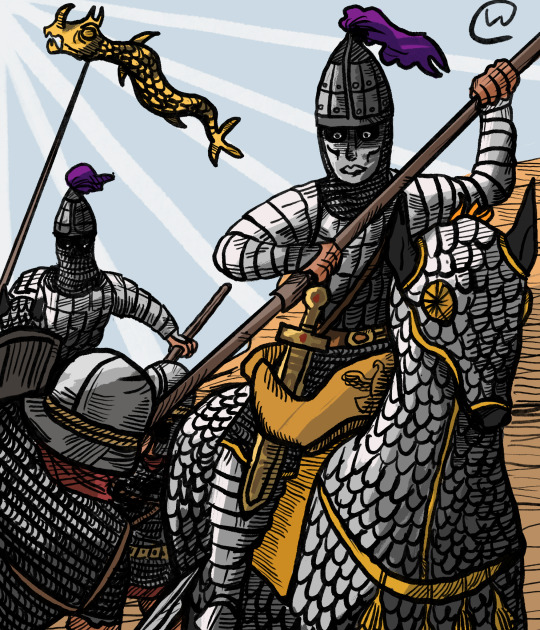
Carrhae battle
#artists on tumblr#artwork#digital art#drawing#drawinyourstyle#illustragram#illustrative art#painting#sketch#ancient history
5 notes
·
View notes
Text
The Death of Caesar (La morte di Cesare) - Gaetano Sertor 1788, translated by me.
Previous scene.
ACT I.
SCENE 7.
Calpurnia and the same.
Caesar. Come, my love.
Calpurnia. My husband,
at last I see you. Such a sweet moment
repays for so much pain!
Caesar. Next to you
I feel my heart overflow with such pleasure!
Ah, I missed only you
to complete my joy!
Cassius. (Mine shall be
to see you dead.)
Caesar. Romans, the good, the glory,
the greatness of Rome have always been
the sole objects of my efforts. Now,
first of all I will direct my cares
to setting laws and securing authority.
Then I shall like to accomplish
other endeavors.
Porcia (quietly to Albinus). Do you hear this?
Albinus. He alone
already commands all.
Caesar. In the meantime, I want this day
to be given to feasts, to the celebration of the Lupercalia.
Brutus. You did a lot, Caesar,
it is true, and you give us a lot to hope for.
But at this time Rome,
drained of gold and people, wants only
peace and liberty.
Caesar. As long as even
a single enemy of Rome remains standing,
you hope in vain that Caesar shall rest.
So swiftly you forget
the unavenged shadow of Crassus?
And how long will the Parthians
gloat over our disasters? And on whom
does the implacable vengeance depend,
if not on me?
Calpurnia. My husband, and you want
to expose yourself to new dangers?
Caesar. Calpurnia, if you love me,
then love my glory.
Brutus. The defeated Egypt,
Africa, the Gallias
and the Hispanias are not enough
to satisfy your glory? Is it not
time to rest yet?
Caesar. With dishonour,
with Rome in danger,
how could I rest?
Antony. Who could advise
such cowardice?
Cassius. Must we gamble
the weakened empire on the dubious outcomes
of barbaric battles?
Caesar. Rather, with my victories
I want to deprive barbarians
of every hope and every route.
Brutus. The grim memories
of the Cimbri and the Teutons
are still fresh.
Cassius. Nor are the Parthians
less fierce than the Cimbri.
Caesar. But do you forget
that I am Caesar? The one who subdued
the fierce Gauls and the faraway Britons
and the ferocious Germans? I retain
the same heart, the same soul, and I have never been
more certain of victory. Do you not remember
the heavenly oracle, that promises you
the empire of the world? Yes, yes, o Romans,
I am he by whose deeds you will see
the whole world subjected to the Capitol,
and you will be, thanks to me,
the arbiters of the Earth. My valour shows me
a new camp of laurels and palms.
A god inspires me and calls me to triumph.
(aria)
I shall tame the haughty arrogance
of every bold soul.
Expanding the empire
is a task reserved for my valour.
But away with all vexing thoughts
on such a beautiful day.
Today I am breathing
sweet air of love.
I am full of joy
next to you, my love -
to you, who I adore,
who is the light of my eyes,
the life of my heart.
(exit with Calpurnia and Antony)
[Link to the original, via Corago.]
Original text under the read more.



#the unavenged shadow of crassus appears! cassius has carrhae flashbacks and wants caesar to die! brutus talks about the battle of arausio!#la morte di cesare english translation#la morte di cesare#opera#translation#gaius cassius longinus#marcus junius brutus#porcia catonis#decimus junius brutus albinus#calpurnia pisonis
4 notes
·
View notes
Photo

Psychological Intimidation at the Battle of Carrhae
Psychological intimidation in military conflict has been an art of war since ancient times. Employing misinformation, feigned movements, subtle messaging, and overt display of aggression, its employ is meant to unnerve the enemy before engagement. Surena, the Parthian commander, used it brilliantly against Rome's Crassus, before and during the Battle of Carrhae, in 53 BCE.
Parthian Cataphract
Simeon Netchev (CC BY-NC-SA)
Continue reading...
39 notes
·
View notes
Text
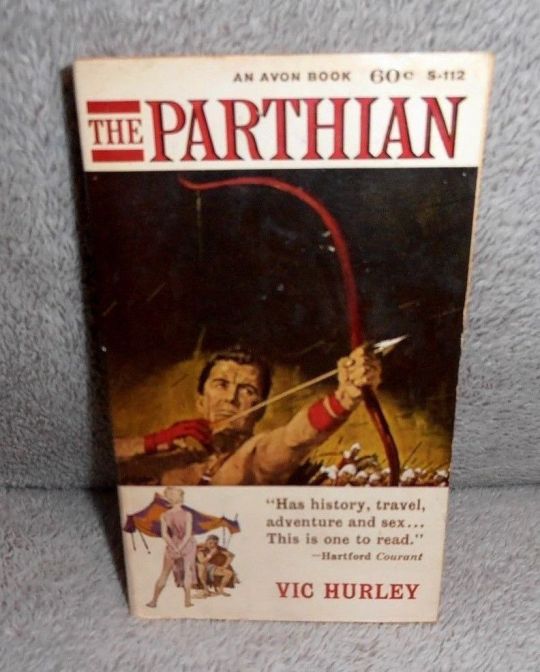
The Parthian is a Great historical adventure novel. I found a battered paperback copy of it in one of my bookcases , I intend to read it again. Finding an old book for me is sometimes like reconnecting with an old friend. Set in the period between 50 B.C. and 17 A.D., “The Parthian” is as much a historical study as it is an exciting saga. Vic Hurley’s vivid narrative provides a factual examination of various ancient cultures; from their military tactics and power structures to their religions, domestic roles and views of women. While “The Parthian” appeals both to readers seeking historical knowledge and those seeking a compelling story, it is an ideal novel for those seeking both.
Decius, the son of a captured Roman centurion, has been raised in the Parthian city of Carrhae after the Parthians decisive victory over the Romans at the Battle of Carrhae. Decius’s family has prospered throughout Decius’s youth to achieve relative prominence within the Parthian Empire. With Decius’s family and the Parthian Empire ever threatened by the specter of a renewed Roman invasion, Decius's father has trained him as a warrior archer since youth and instructed him in the tactics of war. Now a man, Decius joins the Parthian ranks as the Roman threat materializes. But when a chance encounter leads Decius to investigate the Parthian temple of the powerful and mysterious priests of Ahriman, he uncovers a dangerous secret that endangers his family from within the Parthian Empire as much as any Roman legion on the battlefield. His response to that secret sparks an adventure that will take him as far as Rome in the West and Cathay in the East.
Hurley also wrote another old book on my bookshelf see below on top shelf 6th in from left side, Arrows against Steel, a history of military archery with emphasis on the development and use of horse archery.

2 notes
·
View notes